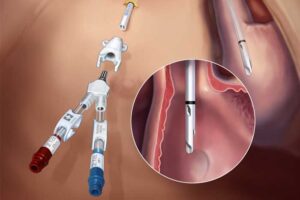What are the Treatment Options for Varicose Veins? varicose veins are a common medical condition that affects millions of people around the world. These swollen and twisted veins often appear on the legs and can cause discomfort, pain, and cosmetic concerns. If you’re dealing with varicose veins, you may wonder what your treatment options are and what kind of healthcare professional you should consult. In this comprehensive guide, we’ll explore the various treatment options for varicose veins and shed light on what a vein doctor is called.
Understanding Varicose Veins
Before diving into treatment options, it’s essential to understand what varicose veins are and what causes them. Varicose veins are enlarged and bulging veins that typically develop in the legs. They occur when the valves in your veins, which are responsible for ensuring blood flows in one direction, become weak or damaged. When these valves malfunction, blood can flow backward and pool in the veins, leading to their enlargement and the characteristic appearance of varicose veins.
Risk Factors For Varicose Veins
Several factors increase your risk of developing varicose veins, including:
- Age: Varicose veins are more common as you get older.
- Gender: Women are more likely to develop varicose veins than men.
- Family history: If your close relatives have varicose veins, you’re more likely to develop them.
- Obesity: Excess body weight can put extra pressure on your veins.
- Pregnancy: The increased blood volume and pressure during pregnancy can lead to varicose veins.
- Prolonged standing or sitting: Jobs that require long periods of standing or sitting can increase your risk.
- Lack of exercise: Physical inactivity can weaken your veins and contribute to varicose vein development.
Now that we have a basic understanding of varicose veins let’s explore the various treatment options available.
Treatment Options For Varicose Veins
Lifestyle Changes
In mild cases of varicose veins, making simple lifestyle changes can help alleviate symptoms and prevent the condition from worsening. These changes may include:
- Regular exercise to improve circulation and strengthen leg muscles.
- Maintaining a healthy weight to reduce pressure on your veins.
- Elevating your legs whenever possible to encourage blood flow.
- Avoiding prolonged periods of sitting or standing.
Compression Stockings
Compression stockings are a non-invasive treatment option that can provide relief from the symptoms of varicose veins. These stockings apply pressure to your legs, helping to improve blood flow and reduce swelling. They come in various compression levels, so it’s essential to consult with a healthcare professional to determine the right level for your condition.
Sclerotherapy
Sclerotherapy is a minimally invasive procedure commonly used to treat small to medium-sized varicose veins and spider veins. During the procedure, a special solution is injected directly into the affected veins, causing them to collapse and eventually fade away. Sclerotherapy is an effective treatment for improving the appearance of varicose veins and reducing associated symptoms.
Endovenous Laser Treatment (Evlt)
Endovenous Laser Treatment, or EVLT, is another minimally invasive procedure used to treat varicose veins. It involves the use of laser energy to heat and seal off the damaged vein. EVLT is highly effective in treating larger varicose veins and offers a quicker recovery compared to traditional vein stripping surgery.
Radiofrequency Ablation (Rfa)
Radiofrequency Ablation, or RFA, is a minimally invasive procedure that uses radiofrequency energy to heat and close off varicose veins. Like EVLT, RFA is an effective option for treating larger veins. It’s performed under local anesthesia and typically involves minimal discomfort and a short recovery period.
Venous Stripping Surgery
In more severe cases of varicose veins, where non-invasive and minimally invasive treatments may not be suitable, venous stripping surgery may be recommended. During this surgical procedure, the affected veins are removed through small incisions. While it is an effective treatment, it often requires a more extended recovery period and may leave scars.
What Is A Vein Doctor Called?
Now that we’ve discussed the various treatment options for varicose veins, you may be wondering what type of healthcare professional you should consult for your condition. A healthcare specialist who specializes in diagnosing and treating venous disorders, including varicose veins, is commonly referred to as a “phlebologist” or a “vascular surgeon.”
Phlebologist
A phlebologist is a medical doctor who focuses on the diagnosis and treatment of vein-related conditions. They are trained to use various diagnostic tools and techniques to assess the health of your veins and recommend appropriate treatments. Phlebologists often perform minimally invasive procedures like sclerotherapy and may work closely with vascular surgeons when surgical intervention is necessary.
Vascular Surgeon
Vascular surgeons are medical doctors with specialized training in vascular surgery. They are experts in treating conditions that affect blood vessels, including arteries and veins. When varicose veins require surgical removal or complex intervention, vascular surgeons are the specialists who perform procedures like venous stripping surgery, EVLT, and RFA.
Conclusion
What is a Vein Doctor Called? varicose veins can be a source of discomfort and concern, but with a variety of treatment options available, relief is possible. Lifestyle changes, compression stockings, and minimally invasive procedures like sclerotherapy, EVLT, and RFA offer effective ways to manage varicose veins. In more severe cases, surgical options like venous stripping surgery may be considered.
When seeking treatment for varicose veins, it’s essential to consult with a qualified healthcare professional. A phlebologist or vascular surgeon can assess your condition, recommend the most appropriate treatment, and help you achieve healthier, more comfortable legs. Don’t hesitate to reach out to one of these specialists if you’re experiencing symptoms of varicose veins or have concerns about your vascular health. Remember that early intervention can lead to better outcomes and an improved quality of life.










